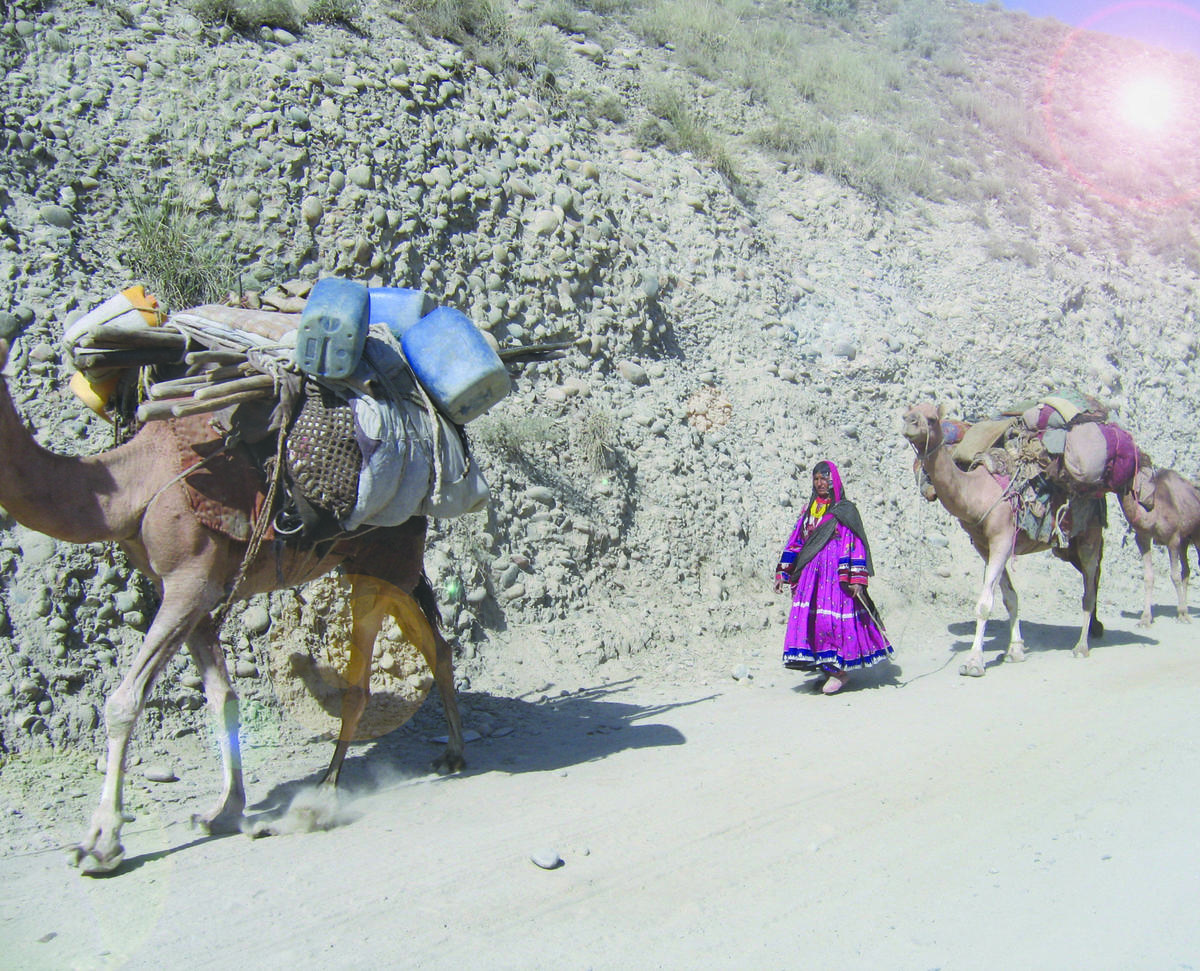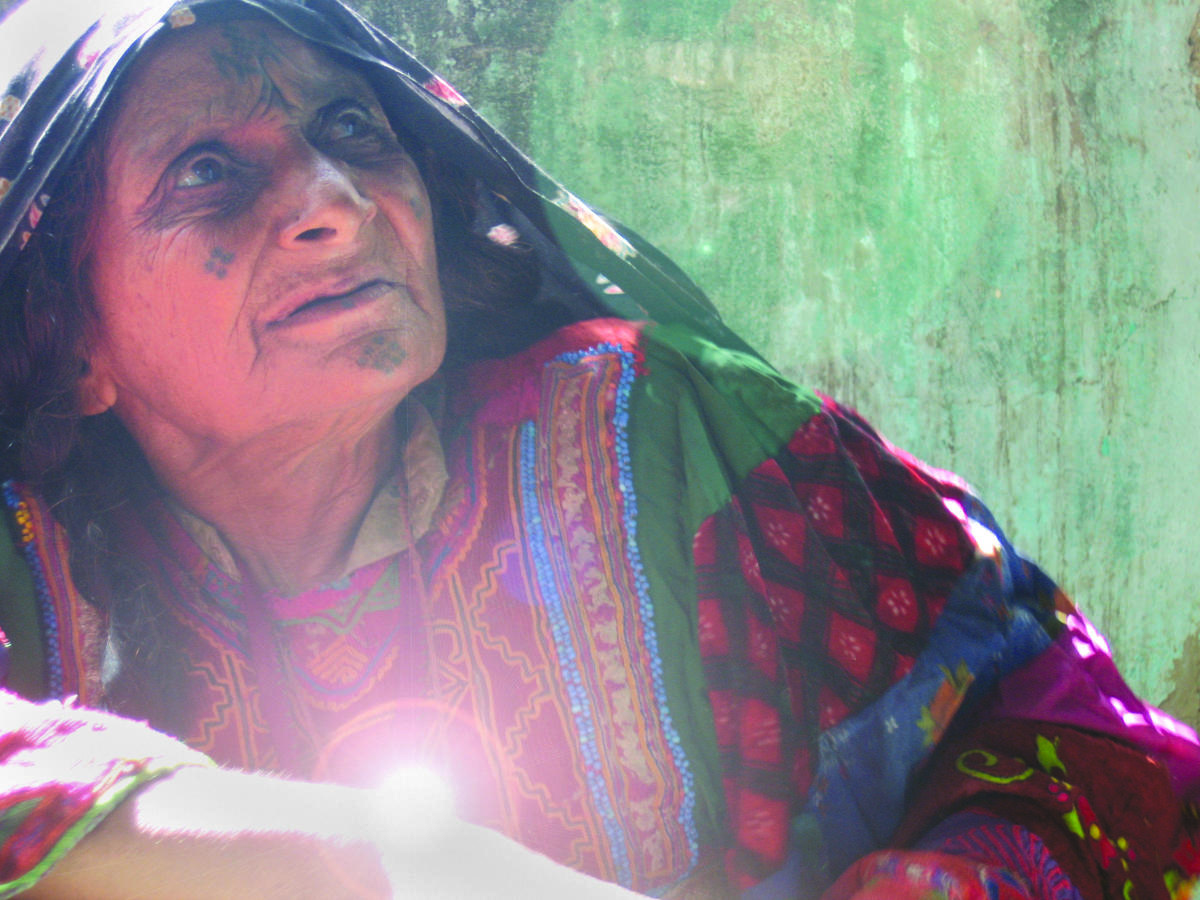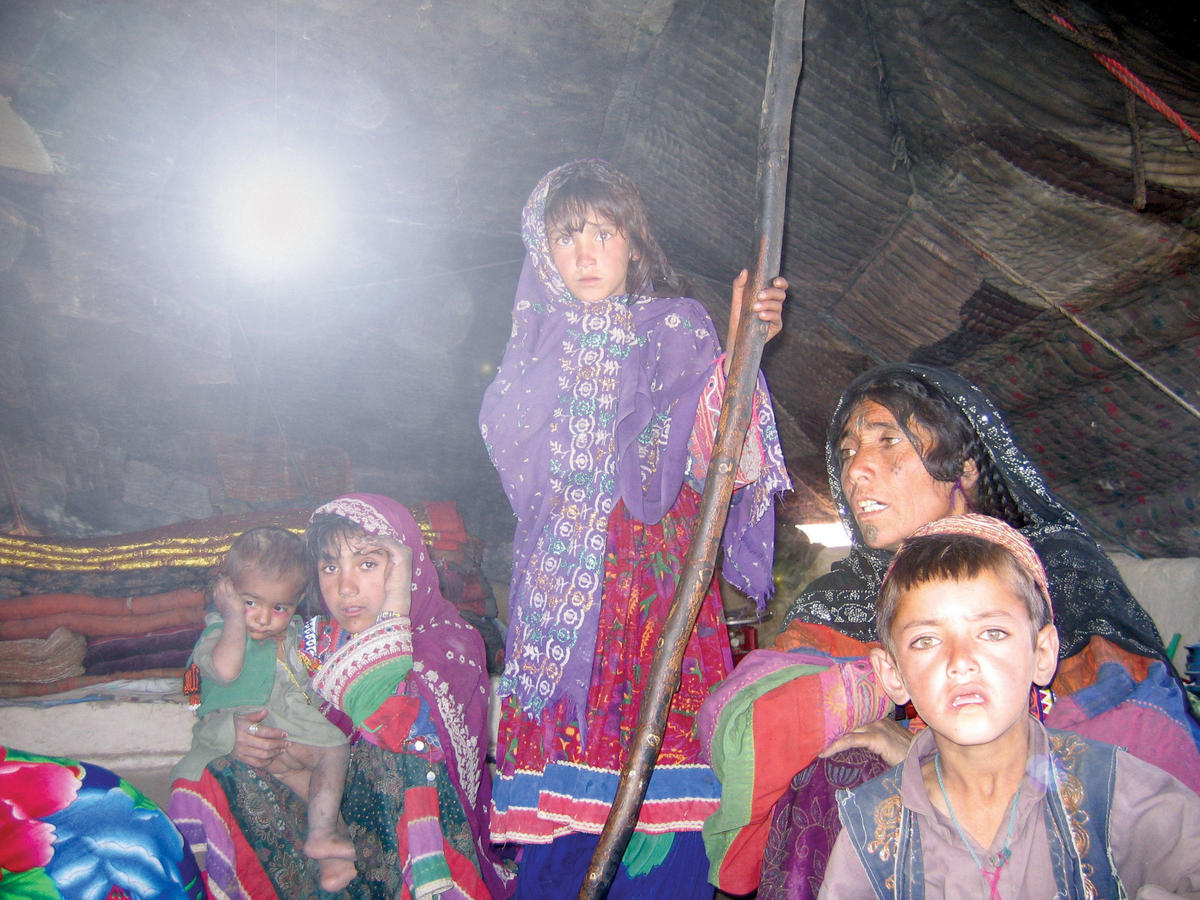
Out of a dust squall in the parched, defeated land, a ribbon of Technicolor crests the desert hills. You’ll see these images all over the Afghan landscape — in crevices of the jagged mountains, on switch-back mountain roads, in the Kandahari desert caves. They may be clans on the move, with camels and goats and sheep and babies. Or just a gang of girls, in dazzling dresses of purple, yellow and red, speckled with sequins and mirrors to guarantee that the sun’s rays and all of us passers-by in our modern transportation won’t miss the spectacle, won’t forget the Kuchis (the Dari word for nomads). The Kuchis are Pashtuns, the dominant tribe in Afghanistan, and though most of them are settled now, once upon a time they were almost all nomads, among them the Afghan royal family.
Whenever I see the Kuchis, they conjure a fantasy of unlimited freedom: no borders, no boundaries, no bonds. And what I envy about them most is that they seem to have banished the essential problem of road life — loneliness — with their collective nomadicity. Intimations of winter, time to move? Take down the tents, pack the tambourines, fold up the dresses, waistcoats, grab the goatskin sacks of water and milk. Tie it all on the camels and go. And everyone goes. It’s easy of course to romanticize the Kuchis, everyone does it. Even they romanticize their way of life as they see themselves becoming more like pariahs and refugees than proud herders and traders.
A few years ago, I was wandering in the mountains south of Kabul with a former Taliban commander when a shepherd dog nearly assaulted us. He was guarding a Kuchi family tucked into a craggy Mordor-like outcropping. A white-bearded willow of a man waved us down. “Come for tea, yogurt; we’ll kill a sheep, spend the night,” he said. We sat under their patchwork tarp to share some tea with rancid milk, as he showed us a suppurating wound on his scrawny leg. It was self-inflicted. He’d burnt his flesh to deaden the nerves and appease his rheumatism. Even the former Talib winced.
The Kuchis are like the Gypsies — bottom rung. Despite their enchanting aura, no one wants them on their land, because their sheep and goats devour crops. And here there’s been drought for so many years. This family had just been kicked off the Hazara highlands nearby. They’d grazed those pastures on and off since the nineteenth century. This time around, the banishment was as much about revenge as land. The Hazara — an ethnic group descended from the Mongols and mostly Shias — see in the Kuchis an enemy Pashtun tribe who collaborated with the Taliban. The Taliban, who were Sunnis, massacred thousands of Hazaras in the late 1990s. Now it was payback time, and the Hazaras had reclaimed the Kuchis’ grazing land. The commander I was with wrote a note to the doctor to admit the old man into the local clinic, while his wife stared at me. She was beautiful if worn, with green tattoos on her chin and forehead, silver saucers in her ears, bangles up and down her arms, and a dusty red and green velvet dress. She had seven sons and six daughters, one of whom was tubercular and hiding in the tent. She prattled on, her green eyes hypnotizing. I asked a friend what she was saying. “Alas, I don’t have any heavy artillery, or I could have killed all those motherfucker Hazara and grazed my sheep there.”
Envy is a tricky chemical. At its best it can inspire competition and be appeased by visionary creation like an extraordinary symphony. Or, it can be appeased by murder. Recently I returned to Afghanistan during the parliamentary and provincial elections. Ten parliamentary seats were reserved for the Kuchis, out of acknowledgment that they make up a sort of mobile province. But they were bitter that they’d have no representation on any provincial council. Their lives seemed to have deteriorated in even three years. I went to visit them in the deserts west of Ghazni city, the old seat of the Ghaznavid empire, where the shrines of poets and Sufis still attract the penitent and desperate and the bazaar still boasts the most supple and aromatic almonds. Ghazni was a Taliban holdout, and I couldn’t help laughing as I watched two grim-faced Talibs conversing at a juice stand shaded by a flimsy banner painted with half-naked Barbie dolls.

One of the Kuchi candidates, Gul Mohammad, had set up his campaign office in a hotel room overlooking a garbage dump. He is a rare Kuchi. He’s educated. He’s a poet. And, more important, he was a professor of literature at Kabul University until the communists threw him out during the 1979 revolution, sending him back to a nomad’s life. After the Taliban fell his fortunes rose again and he was appointed head of education for Ghazni, but not for long. The new, young, pinstripe-suited governor told me he preferred an elegant young woman in place of “that rough primitive looking guy” (Gul Mohammad does have the gnarled-if-handsome Talib look about him). Never mind that she was unqualified; she had the new order look about her. The governor was himself a not so distant descendant of the Kuchis. But most of the settled Kuchis now look upon their mobile clansmen with a haughty disdain similar to that with which the Iranians look upon the Afghans.
Gul Mohammad is angry with everyone, but he salves his temper with a poet’s fatalistic gaze. He compares the Kuchis’ talents to a beautiful desert flower that lives and dies, unseen and unrecorded. “Kuchis have the worst life in the world,” he told me rising on his knees, still sitting cross-legged. And in one long tirade he tried to extinguish my foolish envy. “We still have the primitive life of a thousand years ago, moving from one home to another. We have dusty faces, and if you ask about our lives, they will say, ‘Don’t ask. I’m moving, always moving.’ People would say the deminers are coming. Not Kuchis. Because either it was us, the Kuchis, or the livestock, that were killed by the landmines.” Then he said, “You know, Kuchis have lost so much confidence that even if someone said, ‘Paradise is in your palm,’ we wouldn’t trust them.”
His clan and their fellow travelers were sprawled on a swath of desert, and by early afternoon I could see that signature ribbon of Technicolor resolve into a band of girls balancing on their heads yellow jerry cans of water hauled from thirty kilometers away. They were laughing despite the ordeal. And it is a rough life out here. Take Gul Mohammad’s cousin, a widow now hiding out in a grungy room in the city. Five years ago a boy took out her son’s teeth and never apologized. Finally her son retaliated and punched out his attacker’s teeth. Now they’re in seclusion lest a blood feud ensue. “All fights are usually about jealousy. Someone getting ahead of someone else,” said one Kuchi. Cousinly covetousness is so common that there’s a well-known Pashtu proverb that my old friend Sami, a poet and former Taliban, loves to repeat. “Your cousin is good for fighting another tribe; your brother is good for fighting your cousin, and your son is good for fighting your brother.” Sami has four daughters and no sons and often says, ruefully, “When I die, all my assets will go to my enemies.” Which enemies? “My cousins.” In Pashtu, the word tarbur means “cousin,” but it also describes a state of rivalrous envy. Another kind of envy is siyali, which conveys a kind of insistence on keeping up with the Mohamedzais. A woman goes to a wedding and sees a cousin in a particularly beautiful and expensive dress. Because of siyali, she hounds her husband, casting doubt on his manliness, honor and Afghaniyyat until he buys her a more expensive dress. Siyali also explains why each glass-sided office tower in Shahr-i-Nawin Kabul is at least as high as the one built before it. And why Ashraf Ramazan was murdered in Mazar-i-Sharif — his luxury hotel was larger than Ustad Moham-mad Atta’s, the local warlord.

The Kuchi home is a goat’s wool tarp. Everything happens under there — stories, sex, fights, food. I sat under one to talk to Gul Ba, a big-boned widow and mother of nine. Everyone was chattering at once, saying that before all the wars and drought decimated their livestock and families, they migrated each season without fear of enemies or landmines. Families earned a hefty price for girls — sometimes the equivalent of $15,000, or hundreds of sheep or goats. Gul Ba said that she was happy then. “I was young,” she said.
Now their children have to work in the bazaar washing animals’ hair for a dollar a day. When I asked Gul Ba if she wanted to send her children to school, she unexpectedly shouted, “Why should I? When the government doesn’t consider us as dogs. Has Karzai given me a water well? Or a cemetery to pray for our dead?” A communal cemetery is an archive, a physical memory, and the Kuchis long for it. Now, they bury their dead while on the move, usually forgetting where. Gul Mohammad spoke for many Kuchis when he said, “Don’t settle us. The government should give us money to buy animals, do husbandry, graze, and stay as real Kuchis.”
At night, Gul Ba tells the children long stories to make them forget their hunger. With a little coaxing, she began to narrate the love story of Momen Khan and Sharino — children of two kings bequeathed to one other at birth. The sun was dropping fast. The winds were picking up. The mistress of the tent was scraping up old charcoal in a USA cement sack and the small fire was painting another layer of blackness on the teapot as Gul Ba told us her tale.
By the time Momen Khan came of age, his father had died. He was ready to pay a dowry with his father’s gold until his mother mocked him with the fatal words: “How easy it is for the son to spend the gold his father has earned.” Honor wounded, off galloped Momen Khan to make his fortune in Hindustan. He arrived in a kingdom plagued by a dragon who was only sated with a daily meal of human flesh. That day the king’s daughter was slotted for dragon fodder. Momen Khan saved Sharino by slaying the dragon. The elated king offered him his daughter. That’s where the story’s lesson about Pashtu honor was slipped into the children’s ears. “No,” said Momen Khan. “I rescued her because she’d become my sister. It would be a big shame for a woman to be killed while a Pashtun man stayed alive.” So the king offered to share his kingdom. But Momen Khan was obsessed with the news brought from his homeland by an Iago-like man — Sharino was in the arms of many men. He galloped home that night and went straight to sleeping Sharino. He pulled off each of her seven scarves and touched her chest. Sharino awoke. “Thief, thief,” she cried. Her brother stabbed the intruder.
“Light the lamp,” shouted Sharino. “My pillow is full of blood.” When her brother saw Momen Khan dead, he stabbed himself. “Make another grave, for I want to go with Momen Khan,” said Sharino before killing herself. Momen Khan’s mother buried her son on a hill so she could make pilgrimages to see him. Gul Ba slowed down to recite the last line of the poem. How the mother glowered at Momen Khan’s horse and said, “May all your bones break and your body be cut in pieces. How dare you bring my son from India in the middle of the night?”
We were silent. The sounds of a wedding party tambourine in the hills drifted our way. But still we sat, as if entranced by the power of Othello-like jealousy to kill all. I began to think that it wasn’t the kings and their concubines who needed these tales; it was the rest of us.